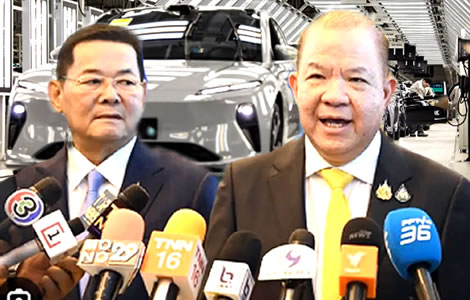Thai EV crisis: Chinese firms struggle with overproduction and government tax penalties threat amid falling global demand. With rising household debt and regulatory hurdles, manufacturers face tough choices—either ramp up production at a loss or repay hefty subsidies and waived import taxes on EV cars coming from China.
Thailand’s brave new EV manufacturing world is in crisis. The sector, which has seen Chinese firms invest billions, is now suffering a market glut as demand for EV cars, both in Thailand and across the world except for China, falls. This year has seen the industry tilt decisively towards HEV or hybrid vehicles. At this time, it is being reported that Chinese firms in Thailand are holding urgent talks with the Chinese Embassy in Bangkok. The firms are bound under Thailand’s 3.0 and 3.5 incentive schemes to ramp up production to match the number of imported vehicles here. However, unable to find export markets for the cars, they are left with a vast dilemma: either manufacture cars that no one wants or pay back subsidies and import tax waivers with penalties on each imported car to the Thai government. Something has to give either on one side or the other.

Newly appointed Thai Minister of Commerce Pichai Naripthaphan has a difficult task. Top of his agenda is tackling the dumping of Chinese products in Thailand. Certainly, he must be tactful and sensitive.
At the same time, according to the Chinese Embassy in Bangkok, up to 80% of Chinese imports into Thailand are ultimately linked with exports from the kingdom, particularly from Chinese firms that have located in the country.
Urgent talks are underway as Thailand’s EV manufacturing sector faces a significant downturn
However, while most of the pain felt by Thai manufacturers is in sectors where Thai firms have become less competitive, a new short-term problem looms. The brewing crisis in the much-vaunted EV sector.
Thailand’s EV manufacturing sector is failing. Urgent talks are taking place behind the scenes to address it. In particular, among Chinese car manufacturers who have taken up the government’s 3.0 and 3.5 incentive programmes.
Undoubtedly, at this time, they are facing an acute dilemma. Meanwhile, as press reporters are eventually forced to reverse the hype and hoopla surrounding EV cars from last year, the problem is being blamed on a poor Thai economy.
Certainly, even this shows that sections of the media and the industry itself are still in denial. At this time, sales of EVs in Thailand are on track to slightly exceed the number sold last year. That was 76,314 vehicles.
Presently, up to the end of July 2024, the number sold comes to 43,411. Certainly, this is nowhere near the projected estimates that between 130,000 and 150,000 vehicles will be sold this year. Furthermore, figures quoted by Thailand’s Board of Investment (BOI) are even more out of touch.
A reality check for Thailand’s EV industry as production-to-import ratios leave Chinese firms in a bind
Significantly, the seven-month figure includes 13,653 vehicles sold in January 2024. In short, the six-month figure from February to July is 29,758. The latter figure is the reality that must be dealt with.
Moreover, Chinese firms have established bases in Thailand to manufacture these vehicles. In summary, we understand there is a current capacity of 490,000 per annum. At the same time, the firms concerned find themselves in a bind. Basically, they have entered into a pact with the Thai government to meet production-to-import ratios.
For instance, in 2024, the ratio is 1:1. This means that for every car imported, one will be produced in Thailand. Of course, there are concerns about what is meant by production in Thailand.
Undoubtedly, as Thai officials have begun to point out to the Chinese manufacturers, very few original parts for these vehicles are manufactured in Thailand.
Lack of demand for EVs and rising household debt in Thailand exacerbate the challenges for manufacturers
Nevertheless, the ratio for imports to production is 1:1.1 in 2025. However, there is a big problem. Presently, there are already hundreds of thousands of unsold EVs in Thailand.
In recent months, large firms have halted imports, but the overflow of stock simply cannot be sold. Nor is the main reason for this lack of demand the overall market for cars. Certainly, Thailand’s economy is in trouble.
A massive buildup of household debt has seen 50% of car loan applications refused this year. Nonetheless, the main reason that so many EVs remain unsold is certainly a specific lack of demand.
Throughout the world, except for China, demand for EV vehicles is petering out. We are told that global demand has risen. However, the ‘global’ demand is artificially inflated by China.
EV sales decline globally with consumer scepticism and falling demand leaving manufacturers vulnerable
Sales of EVs in Europe, once a prime market, are falling. In May, they were down 12% on last year. Undeniably, the market and consumers are rejecting the proposition created by top-down economics.
In June, they fell in Australia, seen this year as a bright spot for the sector. Damning consumer research has emerged. One study conducted by respected consulting firm McKinsey & Co. this year shows that 46% of American and 49% of Australian EV owners will not buy another.
In addition, top insurers in Thailand this year pulled out of the EV market. In short, the market has spoken. However, at this time, the alternative is not a return to ICE (Internal Combustion Engine) cars but a rise in hybrid vehicles or HEV models.
Hybrid technology emerges as a preferred option for consumers and the auto industry worldwide
In effect, this is now a worldwide trend both here in Thailand and in Europe. Furthermore, the motor industry itself has been coming to its senses. At the end of the day, the Japanese automaker Toyota has emerged as the winner.
Despite intense criticism of its lack of focus on EV cars, its hybrid technology is winning the battle in the marketplace. Previously, hybrid technology was seen as an interim stop-gap in the inevitable transition to EV cars.
However, as experiments with EV cars have proven unsatisfactory with a lack of advancements in batteries and range anxiety, the end-users have switched to hybrid cars.
These are vehicles with an ICE (Internal Combustion Engine) and EV facilities combined. In February, an analyst with Morgan Stanley finally admitted the truth. That was Adam Jonas. “I owe Toyota an apology,” he said.
Automakers reconsider EV plans as market response forces a shift to hybrid vehicles and away from false hype
Certainly, like other experts and analysts, he previously lambasted the Japanese automaker for its failure to embrace EV cars. Now across the board, automakers are retreating from the great EV transition.
For example, Volvo has scrapped its plans to sell only EVs by 2030. Likewise, Ford and General Motors have been following suit as EV sales lose traction in the market. “We thought we were further ahead,” admitted GM Chief Executive Officer Mary Barra.
In short, she was referring to the EV transition. In the top tier of management in corporate America and within government agencies, this had been taken for granted.
However, the market reaction to the EV car experience has been decisive. A host of problems, including negligible resale or second-hand values, has seen them rejected. For example, the problems with insuring EV cars in Thailand.
Hybrid vehicles become the focus as automakers like Ford see rapid growth in hybrid sales across global markets
At the same time, auto firms are responding to their markets and developing new and improved hybrid vehicles, which offer greater fuel economy.
For instance, in France, in the first two months of 2024, 36.7% of new registrations were hybrid or HEV vehicles. Certainly, in the French market, sales of EV cars grew marginally also.
In the United States, Ford, which scaled back EV investments and plans, expects sales of its hybrid vehicles to grow by 40% in 2024. At the Geneva Motor Show, leading brands such as Land Rover and MG unveiled hybrid vehicles. In particular, a Chinese-made MG hybrid will retail in the European Union for €20,000.
Certainly, this is not good news for Tesla and its pioneer owner, Elon Musk.
In the meantime, back to Thailand.
Chinese EV manufacturers in Thailand face tough choices as production demands conflict with market realities
Reports last week suggest that Chinese manufacturers in the kingdom have been liaising urgently with the Chinese Embassy in Bangkok.
The firms are in a pickle. In order to comply with terms under the Thai government’s subsidy schemes, they are committed to continuing overproduction.
In contrast, if they opt out, they will be required to compensate Thai authorities. This will be for incentives paid and twice the duty that was waived on imported vehicles. At the same time, plans are still proceeding to expand production, with a projected output of 735,000 EV cars a year mooted.
In short, we have a classic example of the danger and folly of command and control economics. Indeed, if European Union or American officials study what is happening between Thailand and China, it is clear to see that authorities in Beijing have got it wrong, both in China and Thailand. Certainly, also, the Thai government has got it wrong.
Thailand pivots to hybrid vehicles as the EV crisis exposes weaknesses in government policy and market strategy
Although Thailand’s Ministry of Finance in a recent new policy, pivoted to hybrid vehicles, the growing problem of unsold EV vehicles here is turning into a fiasco.
In the meantime, those involved in the industry are blaming it all on a fall in purchasing power.
This year there has been massive price discounting on Chinese EV vehicles. So much so that complaints were made against Chinese firms to regulatory authorities.
This is not surprising given the predicament. Massive numbers of unsold stock are taking up expensive warehousing and storage space, in particular at Laem Chabang Port in Chonburi, where they are shipped into Thailand from China.
Yet this madness continues, driven by the Thai 3.0 and 3.5 incentive policies. In short, subsidies and duty waivers on imported Chinese vehicles of up to ฿150,000 per vehicle. All this while the country’s most valuable manufacturing sector, the production of ICE (Internal Combustion Engine) vehicles, has been ignored but continues to tick over.
Growth of EVs in Thailand stalls while global regulatory hurdles rise along with a switch back to hybrids
Meanwhile, commentators are clinging to the data for the first seven months, including January, showing a slight uptick in EV sales in 2024.
Krisda Utamote is an adviser to the EV Association in Thailand. “It’s not that demand is declining, but when you can’t get loans approved, then it’s game over,” he explains. “Our economic situation isn’t looking good. EV sales are at least still up this year, while it’s all declining for the other types of vehicles.”
In effect, however, demand for EV vehicles has been falling in Thailand this year since February. Furthermore, it is also plummeting in export markets. In addition, both the European Union and the United States are imposing severe regulatory hurdles and tariffs.
At length, this will inevitably be extended to Thailand, given the domination of the industry here by Chinese firms. In turn, these Chinese firms, by their own admission, are being driven by policy mistakes in Beijing.
In short, subsidised EV vehicles have created a market glut. Indeed, a situation quite like China’s property market boom, which failed to understand its limits before foreign capital and inward investment dried up.
EV industry in Thailand struggles with overproduction and the need to comply with the government’s ratios
The EV industry in Thailand is fully aware of the problem.
In the meantime, back to the crunch. Reports last week suggest that Chinese manufacturers in the kingdom had been liaising urgently with the Chinese Embassy in Bangkok. The firms are in a pickle.
In order to comply with the Thai government’s incentive schemes, they are committed to continuing overproduction. In contrast, if they opt out, they will be required to compensate Thai authorities.
This is in respect of subsidies paid and twice the duty that was waived on imported vehicles.
Policy and economic issues impact the Thai EV sector while the world’s motor industry moves to hybrids
However, significantly, Thailand’s Ministry of Finance in a recent new policy pivoted to hybrid vehicles.
Thailand changes tack as EV revolution turns into a damp squib with warehouses full of unsold cars
Top Thai insurer says no more new policies for EV cars. Later, it emphasised renewals case by case
The falling sales of all cars in Thailand may also be attributed to confusion caused by the heavy-handed EV policy. This year there have been massive price discounts on Chinese EV vehicles.
Thai subsidy policies drive overproduction and new economic challenges for EV makers facing lack of demand
All this while the country’s most valuable manufacturing sector, the production of ICE (Internal Combustion Engine) vehicles, has been ignored but continues to tick over. Meanwhile, commentators are clinging to the data for the first seven months, including January, showing a slight uptick in EV sales in 2024.
Krisda Utamote is an adviser to the EV Association in Thailand.
“It’s not that demand is declining, but when you can’t get loans approved, then it’s game over,” he explains. “Our economic situation isn’t looking good. EV sales are at least still up this year, while it’s all declining for the other types of vehicles.”
In effect, however, demand for EV vehicles has been falling in Thailand this year since February. Furthermore, it is also plummeting in export markets.
Global tariff policies contribute to the EV market glut and challenges ahead. Trump would make things worse
In addition, both the European Union and the United States are imposing severe regulatory hurdles and tariffs. At length, this will inevitably be extended to Thailand, given the domination of the industry here by Chinese firms.
In short, subsidised EV vehicles have created a market glut. Indeed, a situation quite like China’s property market boom, which unravelled when foreign capital investors dried up.
The EV industry in Thailand is fully aware of the problem. “Who will the EV makers who have set up factories here sell their cars to if sales continue to be like this?” This was the question posed by none other than Mr. Suraj Sangseni, President of the Electric Vehicle Association of Thailand.
“We want to prioritise a discussion with the government on tackling household debt, which is the main reason why auto sales are falling.”
Certainly, the Board of Investment (BOI) has urged the Chinese firms who have now invested billions in the kingdom to address the problem. It has urged them to find export markets. However, market demand worldwide is flagging. In addition, regulatory blocks are appearing. Certainly, the situation will worsen if former US President Donald Trump returns to the White House in 2025.
Import figures and overproduction issues exacerbate Thailand’s EV market crisis as Chinese firms face a crunch
Thailand’s Excise Department, meanwhile, has provided figures on EV imports under the first 3.0 incentive scheme up to 2024. In total, 185,029 vehicles were imported. The figures show 84,195 imported vehicles in 2022 and 2023.
The figure for this year is 66,448, and a further 34,386 vehicles are to be imported by 2025. Undeniably, these are substantial figures and correspond approximately with projected sales figures for 2022, 2023, and 2024 combined
Notably, these figures ignore the 3.5 programme that runs to 2027. In short, it suggests that the ball may now be in the court of the Chinese EV manufacturers.
They are required to now ramp up production to match these figures. Otherwise, they face a demand for repayment of subsidies and waived duties. Significantly, there is a penalty demanding repayment of twice the import tax if the production quotas are not met.
In the meantime, this is why Chinese firms are now conversing with their embassy. One source to these talks admitted that the situation is presently up in the air.
Price war, overproduction and weak demand create chaos and financial strain for Chinese EV makers in Thailand
“We must admit that the car market, especially the Chinese EV segment, has been quite chaotic. Operators have been competing with severe price reductions, significantly impacting the industry’s overall image,” he said.
Sources to the talks agree that China has been dumping unsold EVs into the Thai market. However, the chickens are now coming home to roost.
At the same time, the excess supply has caused a price war. In turn, this has cost Chinese firms money while also getting the industry into trouble with summer regulatory agencies.
“There are still many problems to come, especially as new Chinese brands will enter the market later this year. Meanwhile, dealers’ profits from car sales have shrunk significantly due to the price war. Now it’s about who has the longer financial runway because a business where everyone is losing money won’t last long.”
Significantly, the same source has urged that the matter be resolved. Importantly, it suggested that Thailand does not want to make the same mistakes made in China.
Join the Thai News forum, follow Thai Examiner on Facebook here
Receive all our stories as they come out on Telegram here
Follow Thai Examiner here
Further reading:
Thailand changes tack as EV revolution turns into a damp squib with warehouses full of unsold cars
Top Thai insurer says no more new policies for EV cars. Later, it emphasised renewals case by case
Lack of coherence in government policy is the root cause of Thailand’s massive economic problems
Disturbing questions that must be confronted over Thailand’s reeling economy are China and EV cars
First-quarter GDP growth surprises analysts based on higher tourism and consumer spending growth
Central bank holds interest rates. Economy will grow 2.6% in 2024 as Srettha pushes home ownership


















